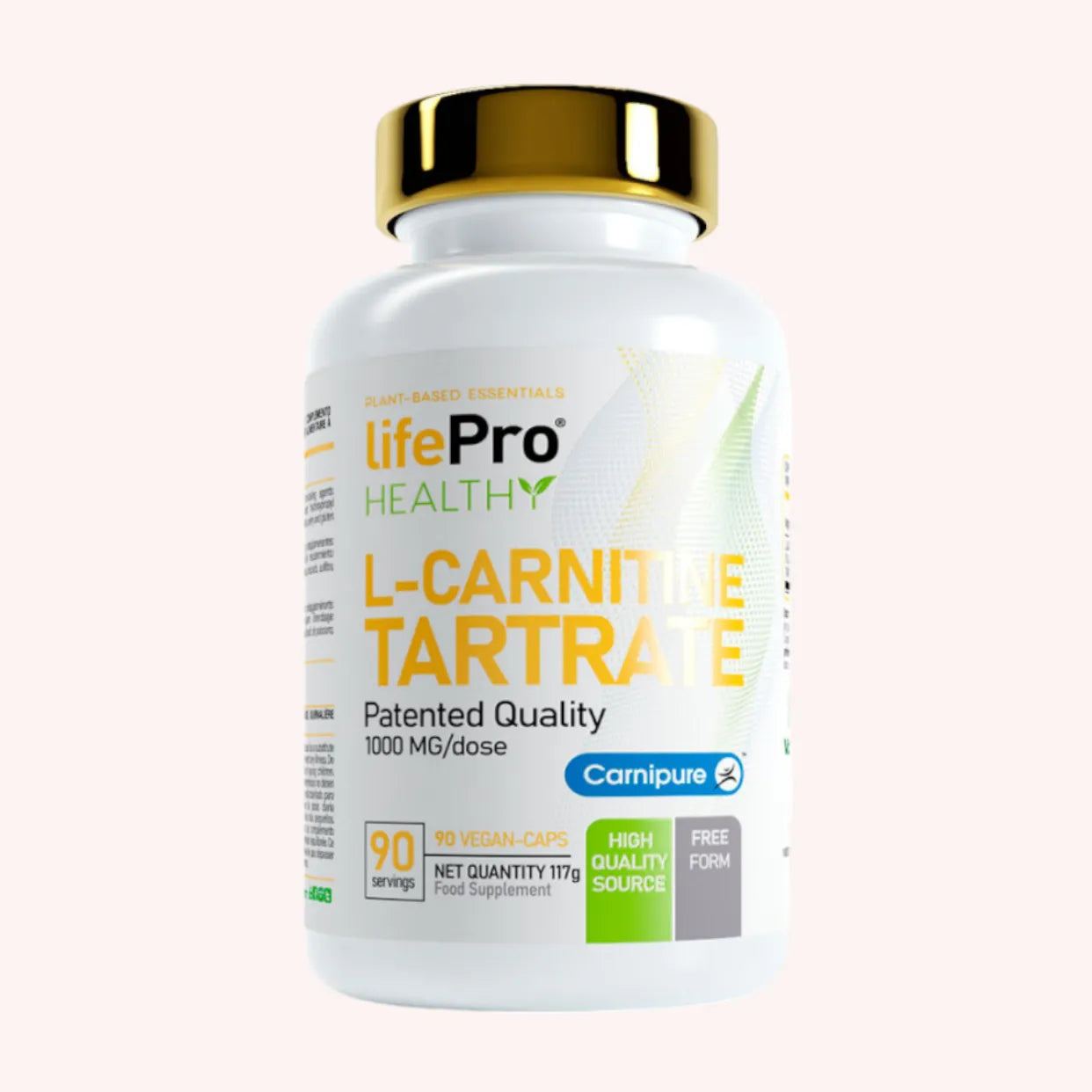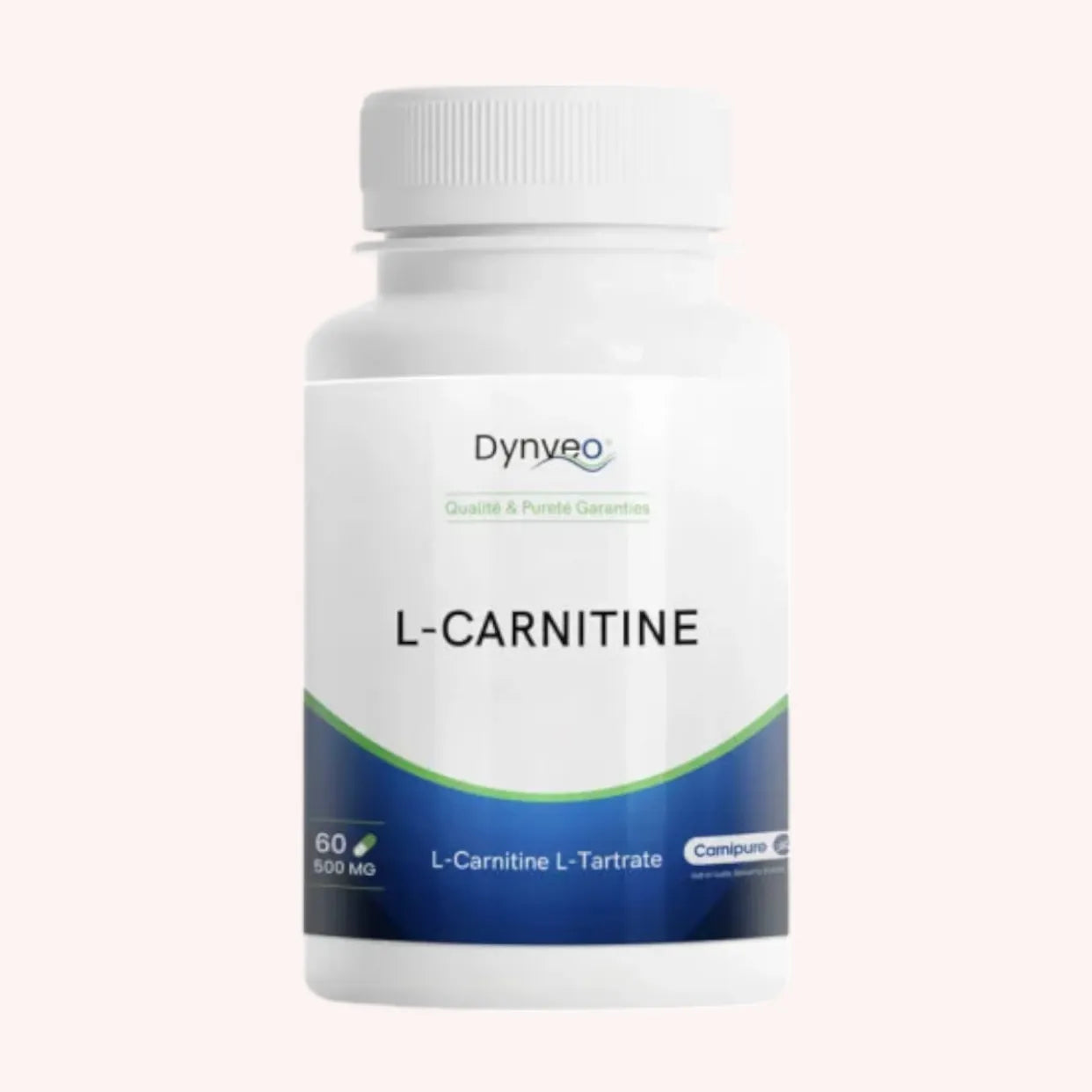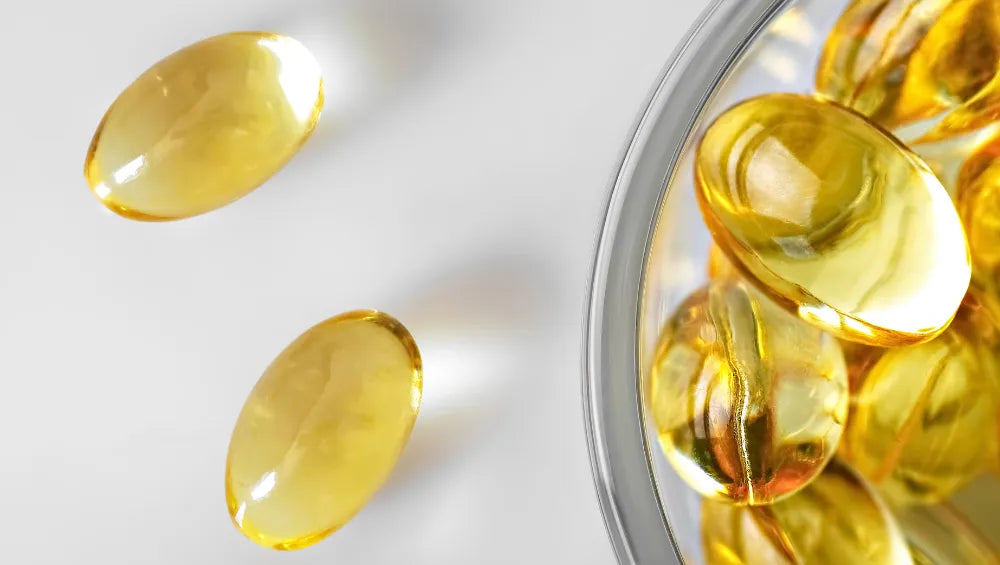L-Carnitine is an amino acid often highlighted for its many benefits, particularly for athletes and those looking to improve their physical performance or general health.
Here, we will take an in-depth look at the benefits of L-Carnitine , its food sources, recommended doses, and precautions to take to optimize its effects.
What is L-Carnitine?
L-Carnitine is a non-essential amino acid, meaning the human body can produce it from the amino acids Lysine and Methionine . It plays an essential role in transporting long-chain fatty acids into the mitochondria of cells , where they are oxidized to produce energy. This process is vital for the proper functioning of muscles, but also the heart.
Different types of Carnitine
- L-Carnitine Tartrate: Often used in sports supplements, it is known to speed up recovery after exercise.
- Acetyl-L-Carnitine (ALCAR): Particularly effective in supporting brain health, it crosses the blood-brain barrier.
- L-Carnitine L-Tartrate (LCLT): Used to enhance post-exercise recovery and optimize athletic performance. It also helps reduce markers of metabolic stress.
- Propionyl-L-Carnitine: Studied for its effects on the heart and blood circulation, it is often used to improve peripheral blood circulation.
Food sources of L-carnitine
Daily diet
L-Carnitine is found in a variety of foods. A varied diet helps you maintain adequate L-Carnitine levels in your body.
- Meat: Red meats, in particular, are rich in L-carnitine. For example, 100 grams of beef contains approximately 81 mg of L-carnitine.
- Fish: Some species of fish such as cod also contain L-Carnitine, with about 5 mg per 100 gram serving.
- Dairy products: Milk and cheese can provide a significant amount of L-carnitine. For example, 100 ml of whole milk contains approximately 3 mg of L-carnitine.
- Avocado: This fruit is a notable plant source of L-Carnitine, although less concentrated than in animal sources.
- Tempeh: This fermented soy product is an excellent source for vegetarians and vegans.
Food supplements
For those with increased L-Carnitine needs, a sports food supplement that represents an effective alternative.
They come in various forms: Capsules, tablets, powders, etc.
It is important to follow the recommended dosages and consult a healthcare professional before starting any supplementation.
The benefits of L-Carnitine
Improved physical performance
L-Carnitine is important for your energy production. If you exercise regularly, it will definitely help improve your performance.
- Increased endurance: By facilitating fat metabolism, it allows athletes to train longer and delay fatigue. Studies have shown that L-carnitine supplementation can improve physical endurance by increasing fat oxidation during exercise.
- Fast Recovery: L-Carnitine helps reduce muscle soreness and speed up post-exercise recovery. It also helps decrease markers of muscle stress, which promotes faster and more efficient recovery after intense training.
Cardiovascular support
L-Carnitine is also beneficial for your heart health .
- Heart health: It promotes mitochondrial function, thus improving energy production in the heart . This can help improve cardiac performance.
- Improved Circulation: It helps improve blood circulation . Studies have shown that L-Carnitine can improve endothelial function and increase blood flow .
Neuroprotective potential
Acetyl-L-Carnitine, in particular, has shown beneficial effects on brain health.
- Cognitive Function: It can improve memory and concentration. Acetyl-L-Carnitine has the ability to cross the blood-brain barrier, allowing it to have a direct impact on the brain.
Weight loss and metabolism
L-Carnitine helps optimize fat metabolism, which may aid in weight loss .
- Fat Burning: By transporting fatty acids to the mitochondria, it helps burn body fat. This helps convert stored fat into energy, which can aid in weight loss .
- Decreased appetite: Some users have reported a decrease in appetite with L-carnitine supplementation. Although the exact mechanisms are not fully understood, this may be due to improved energy regulation.
Natural antioxidant
L-Carnitine has antioxidant properties, thus protecting cells against oxidative damage.
- Cell protection: It helps neutralize free radicals, thus reducing oxidative stress and protecting cells from damage.
Dosage, Safety and Recommendations
Recommended dosage
The dosage of L-Carnitine depends on each person's individual needs and goals.
- Athletes: Between 1,000 and 3,000 mg per day to improve performance and recovery.
- Heart health: Between 500 and 1,000 mg per day to support heart function.
- Cognitive support: For Acetyl-L-Carnitine, between 600 and 2,500 mg per day.
Time of taking
It is generally recommended to take L-carnitine on an empty stomach or with a low-carb meal to maximize its absorption. Some studies suggest that taking L-carnitine before exercise may enhance its effects on performance and recovery.
Side effects and precautions
L-Carnitine is generally well tolerated, but it may cause side effects in some people.
- Side effects: Nausea, abdominal cramps, diarrhea. These effects are usually mild and disappear with dosage adjustment.
- Precautions: Always consult a healthcare professional before starting any supplementation, especially if you are taking medication or have pre-existing medical conditions.
Drug interactions
L-Carnitine may interact with certain medications.
It is essential to consult a doctor before combining L-carnitine with treatments to avoid unwanted interactions.
Overdose
Although L-carnitine is considered safe, overdose can cause adverse effects. It is important not to exceed the recommended doses to avoid potential complications.
Dosage, Safety and Recommendations
Athletic performance
Studies have shown that L-carnitine can increase carnitine content in muscles and potentially improve athletic performance by reducing fatigue.
Numerous studies show that L-Carnitine supplementation can improve physical endurance .
Weight loss
A 2016 study in Obesity Reviews suggested that L-Carnitine may play a role in weight reduction in obese individuals.
However, these results appear to be more significant when supplementation is combined with a diet and exercise program.
Neuroprotection
The neuroprotective potential of Acetyl-L-Carnitine (ALCAR), a form of L-Carnitine, has been studied for its positive effects on the brain.
Male infertility
Several studies show that L-Carnitine may improve sperm quality and increase sperm motility.
L-Carnitine is a supplement with multiple benefits, ranging from improving athletic performance to supporting heart and cognitive health.
To get the most out of L-Carnitine, it is essential to follow the recommended dosages and consult a healthcare professional . Integrated into a balanced diet and an active lifestyle, L-Carnitine can be a valuable ally for your overall well-being.
Sources:
- Pekala J, Patkowska-Sokoła B, Bodkowski R, Jamroz D, Nowakowski P, Lochyński S, Librowski T. "L-carnitine--metabolic functions and meaning in humans life." Curr Drug Metab. 2011 Sep;12(7):667-78. doi: 10.2174/138920011796504536 : https://pubmed.ncbi.nlm.nih.gov/21561431/
- Mielgo-Ayuso J, Pietrantonio L, Viribay A, Calleja-González J, González-Bernal J, Fernández-Lázaro D. “Effect of Acute and Chronic Oral l-Carnitine Supplementation on Exercise Performance Based on the Exercise Intensity: A Systematic Review.” Nutrients. 2021 Dec 3;13(12):4359. doi:10.3390/nu13124359. : https://pmc.ncbi.nlm.nih.gov/articles/PMC8704793/
- Ferreira GC, McKenna MC. “L-Carnitine and Acetyl-L-carnitine Roles and Neuroprotection in Developing Brain.” Neurochem Res. 2017 Jun;42(6):1661-1675. doi:10.1007/s11064-017-2288-7. : https://pubmed.ncbi.nlm.nih.gov/28508995/
- Sahebnasagh A, Avan R, Monajati M, Hashemi J, Habtemariam S, Negintaji S, Saghafi F. “L-carnitine: Searching for New Therapeutic Strategy for Sepsis Management.” Curr Med Chem. 2022;29(18):3300-3323. doi:10.2174/0929867328666211117092345. : https://pubmed.ncbi.nlm.nih.gov/34789120/
- Walter J.H. “L-Carnitine.” Arch Dis Child. 1996 Jun;74(6):475-8. doi: 10.1136/adc.74.6.475. : https://pubmed.ncbi.nlm.nih.gov/8758120/
- Wiseman LR, Brogden RN. “Propionyl-L-carnitine.” Drugs Aging. 1998 Mar;12(3):243-8; discussion 249-50. doi:10.2165/00002512-199812030-00006. : https://pubmed.ncbi.nlm.nih.gov/9534023/
- Gnoni A, Longo S, Gnoni GV, Giudetti AM. “Carnitine in Human Muscle Bioenergetics: Can Carnitine Supplementation Improve Physical Exercise?” Molecules. 2020 Jan 1;25(1):182. doi:10.3390/molecules25010182. : https://pubmed.ncbi.nlm.nih.gov/31906370/
- Li J, Liu L, Weng J, Yin TL, Yang J, Feng HL. “Biological roles of l-carnitine in oocyte and early embryo development.” Mol Reprod Dev. 2021 Oct;88(10):673-685. doi:10.1002/mrd.23542. : https://pubmed.ncbi.nlm.nih.gov/34618389/
- da Silva LE, de Oliveira MP, da Silva MR, Abel JDS, Tartari G, de Aguiar da Costa M, Ludvig Gonçalves C, Rezin GT. “L-carnitine and Acetyl-L Carnitine: A Possibility for Treating Alterations Induced by Obesity in the Central Nervous System.” Neurochem Res. 2023 Nov;48(11):3316-3326. doi:10.1007/s11064-023-04000-z. : https://pubmed.ncbi.nlm.nih.gov/37495838/
- Fortin G. “L-Carnitine and intestinal inflammation.” Vitam Horm. 2011;86:353-66. doi:10.1016/B978-0-12-386960-9.00015-0. : https://pubmed.ncbi.nlm.nih.gov/21419279/








